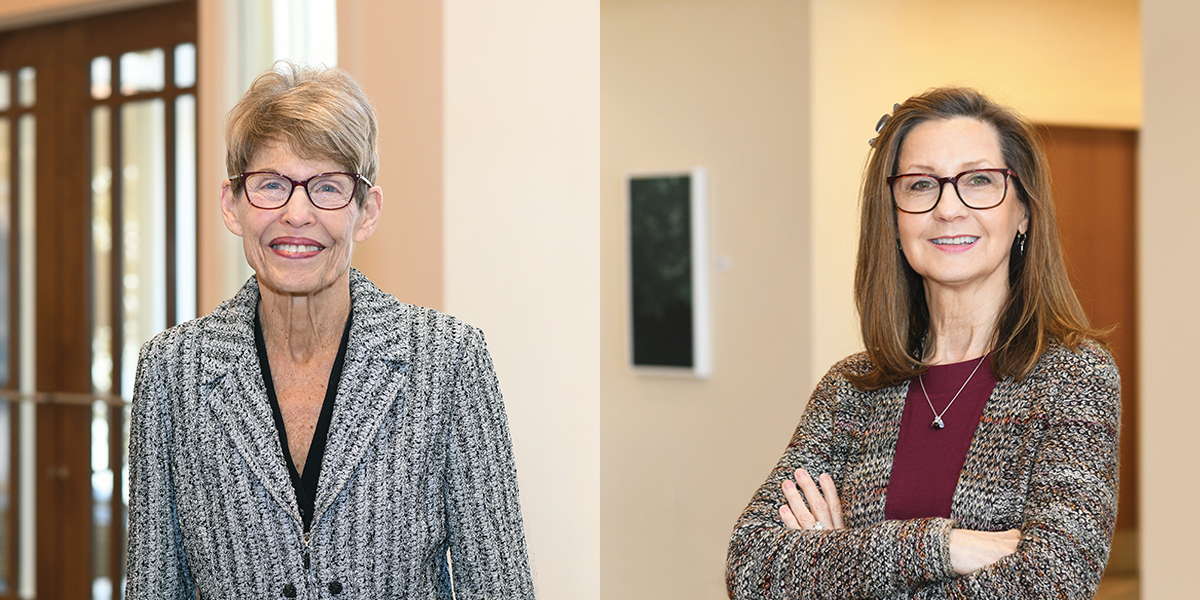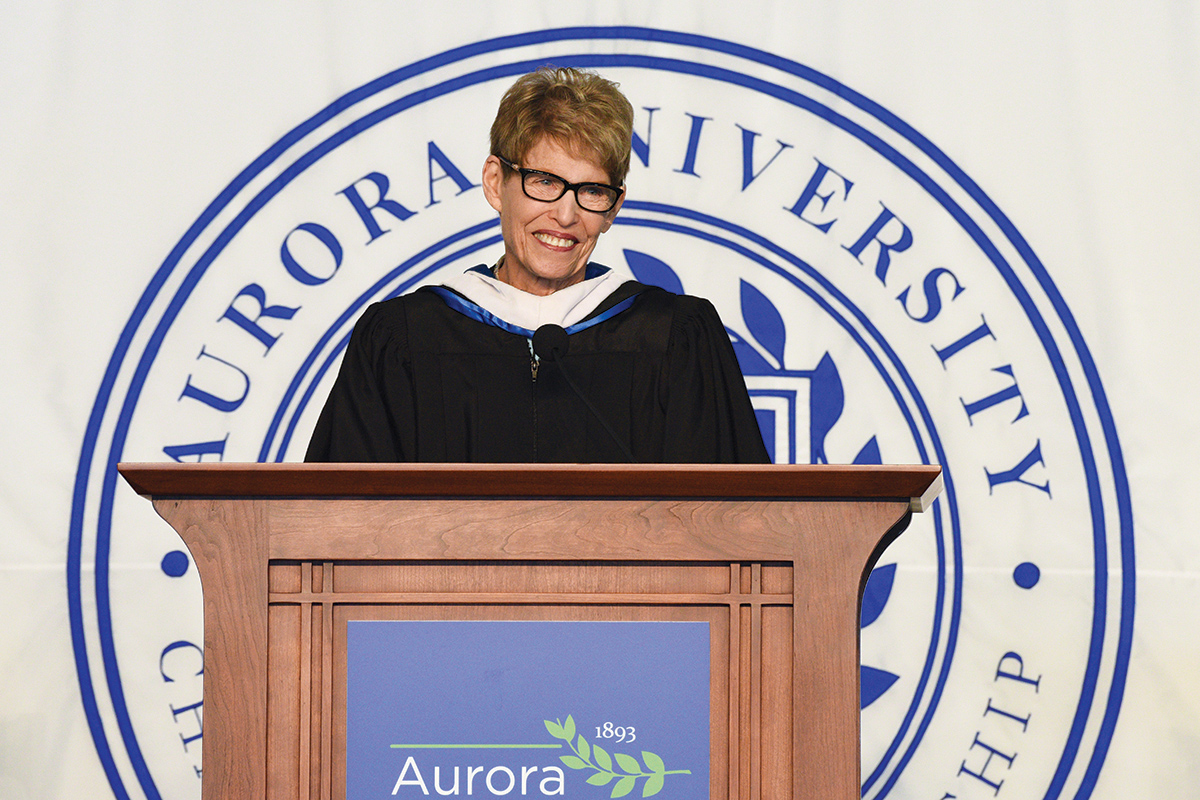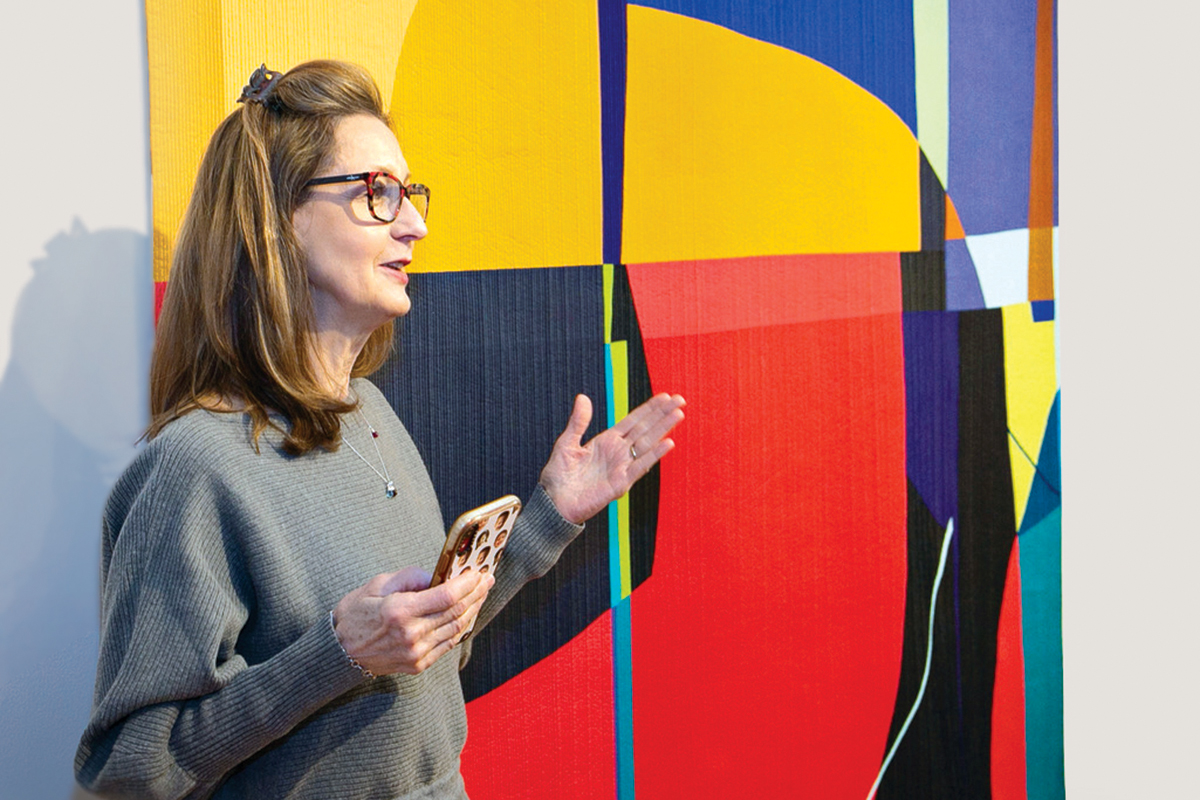A View from the Board of Trustees

Incoming Board chair Chriss Johns and outgoing Board chair Hilary K. Brennan ’83 discuss Aurora University’s decade of growth, the movement to improve student success, and the challenges ahead for higher education.
Chriss Johns, a longtime member of the Aurora University Board of Trustees, was elected chair of the Board this past November. She succeeds Hilary K. Brennan ’83, who continues as a trustee.
For the past six years, Brennan and Johns have worked closely together on the Board as chair and vice chair, respectively, during a period marked by soaring enrollment and expansion, as well as the unprecedented challenges brought on by the COVID-19 pandemic. Brennan has served on the Board since 1987 and as chair for two terms, from 2015 to 2021. Johns has served on the Board since 2007 and was vice chair from 2015 until stepping into the Board chair position. She also served as chair of the Educational Affairs Committee for seven years.
Brennan is an expert in board development for nonprofit organizations. She has guided and mentored many governing boards, serving as board president for the YWCA Aurora, Fox Valley United Way, and Mercy Center for Health Care Services. She has been a director of the Community Foundation of the Fox River Valley for 21 years and served as the foundation’s board chair from 2006 to 2007. She has also served on the boards of Provena Mercy Medical Center and Aurora Area Interfaith Food Pantry.
Beyond her extensive board work, Brennan was a director of special projects for the Dunham Foundation in Aurora, the director of marketing and development for the YWCA Aurora, and the mid-states regional coordinator for the YWCA USA.
Brennan graduated from Saint Louis University in 1966 with a Bachelor of Science in psychology and from AU in 1983 with a Bachelor of Arts in accounting.
Johns, for her part, is a real estate investor, educator, and artist. She owned and operated MBS Investments LP, a commercial real estate investment partnership in Sugar Grove, Illinois, until her retirement in 2017. Several of her family members are AU alumni, including her son Bradley Johns ’06 and daughter-in-law Tara Zito Johns ’06.
Johns’ father, C. Tell Coffey ’53, who passed away last year at the age of 91, served on the AU Board of Trustees from 1990 to 1999 and was an emeritus trustee. He was founder of Coffey & Coffey Construction Company, a commercial construction and contracting firm in Aurora that achieved national recognition for developing the industry standard design for hybrid seed corn dryers.
Johns graduated from the University of Illinois at Urbana-Champaign with a Bachelor of Science in education. She spent a summer during college studying art and has continued the creative outlet of painting and creating silk screens in her leisure time.
The following is an edited conversation.
Aurora University: Hilary, you were born in Cleveland and spent time in St. Louis before getting married and moving to Aurora to raise your family. Chriss, you were born in Aurora and now live in Sugar Grove. Tell us about your first recollections of AU.
Chriss Johns: Yes, I grew up in Aurora, just west of campus in the Sans Souci subdivision. Aurora College was a big part of our family history. My dad came from North Carolina to attend Aurora College (before it was renamed Aurora University). He chose to stay in Aurora to start his business and raise his family. Later, in the 1990s, my dad was on the Board, so I was introduced to many people with affiliations to the university. Growing up in Aurora, I rode my bike with friends all over the west side of Aurora and on Aurora College’s campus. In high school, my friends and I liked to watch the Aurora College soccer games. Years later, when I had my own children, I was fortunate to employ several AU students as nannies. The father of one of the students was a theology professor at the college.
Hilary K. Brennan: I was living down the street from AU with small children at home. I had a degree from Saint Louis University in psychology, but thought since I really wanted to work in nonprofit administration that I should learn accounting. AU was just five minutes away, so I came here and got my degree in accounting. I didn’t know much about the school, but I had great instructors, and I took the CPA (certified public accountant) exam and passed. I started to get involved in local boards like United Way and was very active in the community. I got to know a lot of administrators and staff from AU through my volunteer work, especially through the YWCA Aurora, which at that time was a leadership development board for women.
AU: Hilary, you’ve been on the Board 35 years, and Chriss, you’ve been on the Board for 15 years. What do each of you see as AU’s biggest accomplishment during your tenure?

Brennan: At the time I joined the Board in 1987, AU was a sleepy little school, not very visible in the community. Today, you drive down Prairie Street and you’re absolutely overwhelmed by the school. It’s a showpiece of the community. Our enrollment grew to record numbers, so we were graduating a lot of students from here, and we were just more visible in the community. We also strengthened the university’s diversity and in 2016 received federal designation as a Hispanic-Serving Institution, an achievement that I was very proud of when I was chair.
I attribute a lot of that success to AU’s president, Dr. [Rebecca L.] Sherrick, because she’s a visionary and she’s proactive in her thinking. She anticipates problems before they actually occur, and she’s just been very instrumental at making this institution a success.
I’m also very proud to say that I am an AU graduate and that I was chair of the Board — the first woman chair, as a matter of fact. And how smart they are to put a second woman chair in place!
Johns: Well, thank you. And I agree with everything Hilary just said. You can’t look at the enrollment numbers and not notice how much we’ve grown and what a difference we have made in the community. There hasn’t been a time that we weren’t undergoing a capital project here on the main campus and at George Williams College (in Williams Bay, Wisconsin). The campus is beautiful, and that really enhances the experience for our students and our faculty.
There have been so many great things that have happened since I joined the Board in 2007. But one overarching accomplishment — and it’s ongoing — is the ability of all stakeholders to rise to the occasion. We have been through the 2008 financial crisis and its aftermath. That was a very difficult time. And over the past two years, we faced challenges and obstacles from the COVID-19 pandemic. Yet through these hardships, AU has continued to grow.
I just admire the tenacity and the perseverance I see throughout the AU community, not just to survive, but to thrive. So I would say the greatest accomplishment is our ability to thrive despite difficult circumstances. We have been able to do so through the careful allocation of resources and the clear priorities that are driven by our mission.
AU: How do you view the Board’s role in supporting AU’s student success initiatives?
Brennan: I see supporting student success as our primary role. Educational institutions are here to serve students, and that’s always been our focus at AU. In the past few years, we’ve begun to recognize that students need more than just going to the classroom. They need support in balancing their extracurricular activities, in finding internships, in preparing for graduate school or for careers, in staying physically and mentally healthy, and in discerning their vocation and purpose. The bottom line is: As an institution, you can’t have financial stability without student success.
Johns: Yes. I agree. Student success is one of the most important topics we address in our Board meetings, from academic success to extracurricular success. Our focus is on our mission to empower our students to achieve lasting personal and professional success. When we make decisions as a Board, we ask ourselves: How will this decision affect the success of our students? That is the very essence of what we do at AU.
We on the Board look carefully at student success in terms of academic performance, experiential learning opportunities such as internships, and student life — how students experience residence life, social events, athletics, and faith-based activities.
During my time on the Educational Affairs Committee, we relied on assessment results and data to drive our decisions. One concrete example of seeing the data and taking action is the writing initiative. We looked at the assessment results and saw that student writing wasn’t where it should be, so we created a campuswide initiative to improve it. That is just one example of how the university has really risen to the occasion to provide new services.
AU: Chriss, since your retirement from MBS Investments, you’ve been pursuing your passion for creating art. How do you think your perspective as an artist is informing your new role as chair?
Johns: I wanted to study art when I went to U of I, but my dad advised me not to major in art because he thought I could not make a living as an artist. So I did not pursue art as a profession, but I have kept it up as a hobby and have always been very interested in all things made by humans. I have continually studied painting, design, and silk screening over the past 20 years. Never one to sit still, after I retired, I enrolled in art classes with an artist whose work I admired. I now work full time as a studio artist. Recently, I had the opportunity to have several of my art pieces juried into international exhibits in Philadelphia and San Diego.

As for my perspective as chair, I think that all our life experiences influence how we serve as trustees. Since my degree is in education, I am very aware of the practice of teaching and learning. Watching my fellow art students — many of whom are very successful adults — attempt to learn a new subject matter, and seeing their frustration at not having instantaneous success, that was eye-opening. Resilience is something we have to work at, not just as young college students but as adults as well. Art for me is paradoxical, a source of joy and frustration — but mostly joy. I have seen many artists who were once strictly left brained in their careers become wonderful creatives. I count myself among them.
AU: What is the best part of the Board chair job?
Johns: My most enjoyable activity in just the few months I’ve served as chair was to speak at commencement. It was just fun. There is nothing more exciting than to see the faces of the graduates and their families as they celebrate their accomplishments. I remember what it was like to be a college grad, all those feelings one has: excitement, hope, fear, and pride. I see the culmination of all the hard work from everyone — students and their families, faculty, administrators, and trustees — coming to fruition at each graduation. Education changes lives, and never is it more evident than at an Aurora University graduation ceremony.
Brennan: I too find commencement one of the best parts of the job. My son Robert will be graduating with a BA in K-12 Physical Education, and I am excited to present a diploma to a new Brennan AU alum. I feel fortunate to be a part of AU and am proud of all that we have accomplished. The people and the ideas have made this work so fulfilling.
AU: Describe AU’s biggest challenge going forward.
Brennan: The long-term impact of the pandemic on higher education is an ongoing challenge. People are looking at all kinds of different ways to get educated. We have to ask ourselves: What are we doing to help students fulfill their educational goals in an efficient manner? We’ve been looking at some really innovative ways of presenting programs.
Johns: This is a great question, as it is the crux of our responsibility as trustees. We want to be anticipatory in our planning but also nimble enough to make any transition efficiently depending on what the future holds. If nothing else, the COVID-19 pandemic has taught us to expect the unexpected.
There are major demographic changes coming. The population of high school students is shrinking, and that is creating an enrollment challenge for all higher-education institutions. Also, the pandemic accelerated some of the changes that were already underway at colleges and universities, including the increasing appeal of online education. These shifts create risks to sustainability that will need to be carefully addressed.
But overall, I am a very optimistic and hopeful person, so to me the future is promising. We live in a rapidly changing world where there will always be the need for well-trained and competent professionals. We will continue to adjust and address societal shifts, and most importantly, continue to be responsive to meeting the needs of our students.